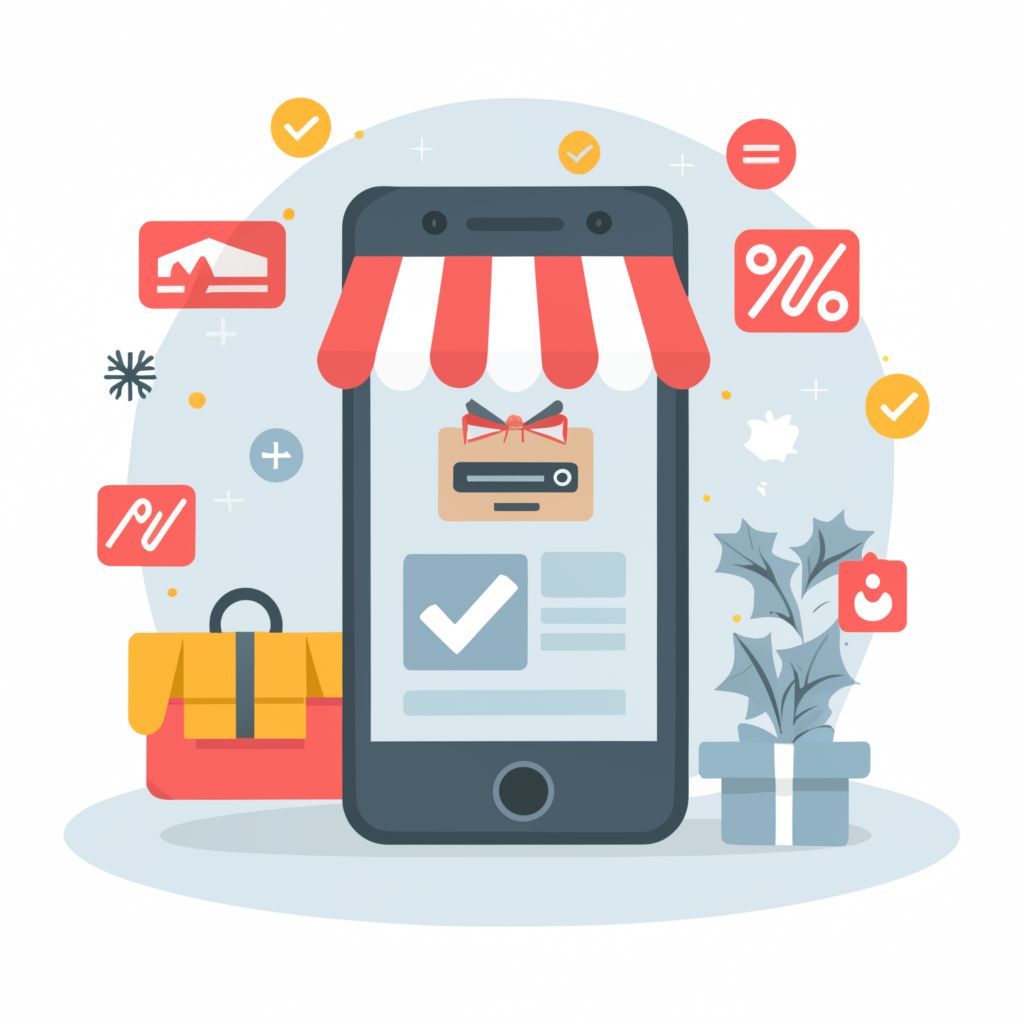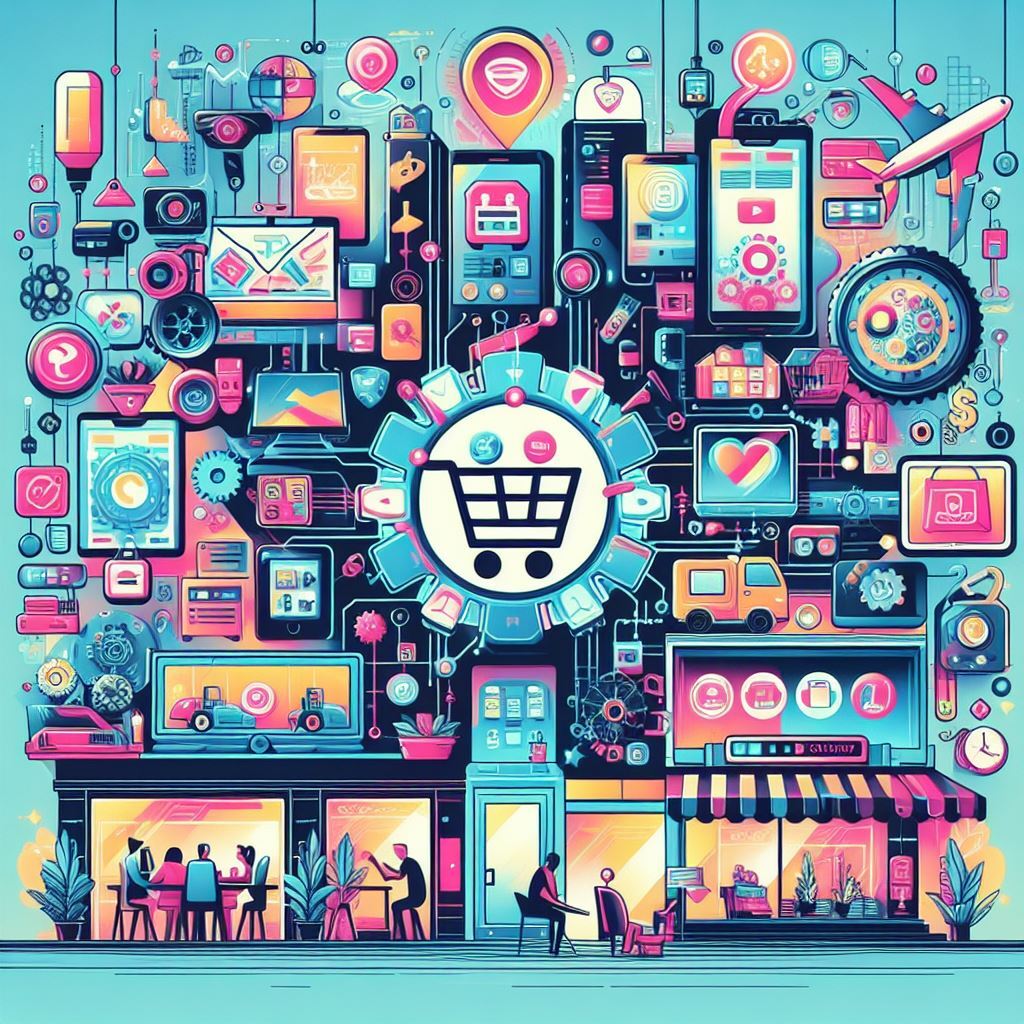In the age of the informed customer, you are not only up against your fiercest competitor but more importantly, you’re up against the multiple sources that shoppers consult during their decision-making processes. Google’s Zero Moment of Truth study revealed that the vast majority of customers use an average of 10 sources of information before making a final decision.
In order to increase your chances of being the preferred seller that these highly aware and digitally-empowered customers turn to, a radical transformation of how you approach “selling” is necessary. Hard statistics alone are not enough to win over audiences.
You must think in the language of the problems you solve for your customers. Focus on the customer relationship, not the transaction and add value each time you interact with them.
The unique value you can bring is a new perspective and your unique expertise to help shoppers solve problems in ways they haven’t yet considered.
By paying it forward, engaging with people and helping them even before they need to buy, you build trust and will be the first supplier they seek when they’re ready to make a purchase.
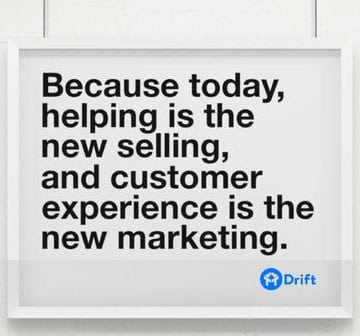
To create positive experiences, you need to stand up for the customer and have their best interests at heart. Help the customers that want to be helped.
Even if it doesn’t win you a sale immediately, it places you high in the customer’s good book. The smallest gestures of exceptional customer service go a long way in gaining a loyal customer for life.
Did you hear the story of the 89-year-old man who was stuck in his Pennsylvanian home due to bad weather, and his worried daughter wasn’t able to get ahold of a store that would deliver food to him? She finally found Trader Joe’s who went out of their way and delivered food to the old man – for free!
The story went viral on Reddit and was taken up by a number of major news publications. Clearly, Trader Joe’s earned many loyal customers that day.
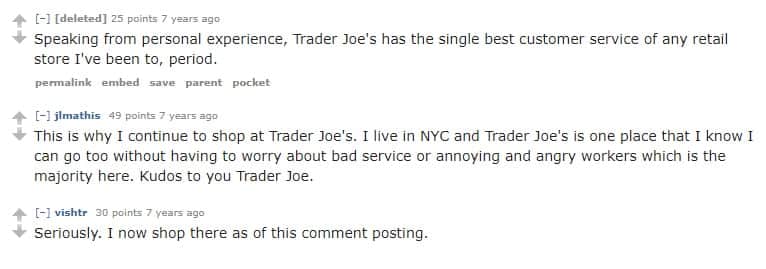
Trader Joe’s helping consumers pays off – consumer reactions on Reddit
It was a simple, human thing to do. That’s what businesses need to do today – bring in the human touch to bridge the digital divide.
Here are a few ways in which you can help your customers and in turn, secure more sales than any marketing strategy:
1) Be Where They’re Looking For Help
Using the power of analytics and social media, you can find out exactly where your potential customers are going for help and be right there to help them out.
@HiltonSuggests is a pilot project by Hilton Worldwide to “surprise and delight”. Hilton Worldwide has its employees scour Twitter for opportunities to help anyone they can – not just clients – and they don’t only recommend their own properties. If anyone looking for a good restaurant, or the best place to get a Chicago deep dish pizza, tweets about it, @HiltonSuggests will provide them with recommendations and advice.
Not only does this gesture establish Hilton as a truly customer-centric brand, but it’s also likely to bring in a ton of social media appreciation, which is easily the holy grail of digital marketing.
I recommend browsing through their conversations on Twitter. You’ll likely find some customer engagement gems like this:
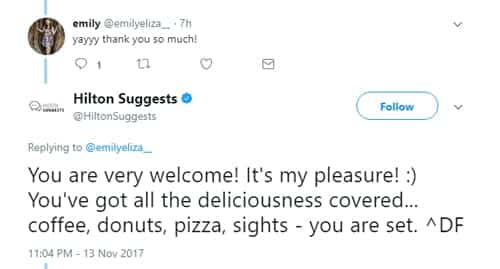
2) Make Selling a By-Product of Helping
When your innate desire is to help a customer, the sales begin to happen effortlessly, and the entire buyer-seller dynamic changes for the better. Think about it – almost everyone has come to associate the term salespeople with pushy selling and clever tactics to trick you into buying something.
It’s time to change this perception.
Goodbye sellers. Hello problem solvers.
Salespeople need to become problem solvers. These are people who aren’t in for a quick buck but are interested in giving a customer the most value. These are experts in their domain who help customers find solutions to problems and eliminate the stress from their experience.
Have you seen how Olay uses their new Olay Skin Advisor to answer the consumer’s call for advice?
At MWC17, Olay, best known for its anti-aging moisturizers and body washes, unveiled their Skin Advisor, a web-based skin analytics platform that uses deep learning to provide women with personalized skin education and product recommendations on their mobile phones or tablets, helping them navigate the often-confusing beauty aisles.
The digital advisor requests just one selfie followed by a short series of questions about personal skin concerns and product preferences, such as, “How Many Products Do You Use Daily?” Then it delivers a personalized regimen recommendation based on Olay’s extensive domain knowledge and expertise. It arms women with the knowledge they need to care for their skin and find the products that are right for their specific skincare needs.

“Shopping for skincare has never been more overwhelming, as women are faced with thousands of products and promises,” said Dr. Frauke Neuser, Principal Scientist for Olay.
“Olay’s research shows that browsing the shelf is the #1 purchase influencer for women, yet 1/3 of women do not find what they are looking for. We saw an opportunity to help women understand their skin better than ever before they even step foot in the store.”
Between late 2016 and early 2017, the solution had already garnered more than one million visits!
“For me this Olay Skin Advisor simplifies taking care of my skin, it means I no longer have to spend hours pursuing skincare aisles or looking for a knowledgeable shop assistant to point me in the right direction for any ageing concern – I can snap a quick photo, jot down my shopping list and hit the shops there and then.” – Review on The Sunday Girl
3) Help Them To Be Successful
Helping shoppers is an art. It requires gaining a deep understanding of their needs and expectations before recommending the most suitable products or the most viable solutions.
Today, listening to your shoppers, educating them and building trust is more important than pushing for a sale. In doing so, you increase the likelihood of them coming back to purchase.
At Shoptalk Europe 2017, Markus Linder, Co-Founder & CEO of SMARTASSISTANT, demonstrated how you can use the SMARTASSISTANT Digital Advice Suite to create interactive content advisors.
These smart solutions do not only recommend the best product for a specific user and situation, but can actually help your customers achieve their goals past a purchase. The advisor understands the shoppers’ needs and pro-actively supplies them with contextually relevant content on different channels, such as on-site, via email and social media.
This is relationship building in a digital age at its best because people don’t buy products, they buy better versions of themselves.
By taking an interest in understanding their needs, you can figure out how to help them be better versions of themselves.
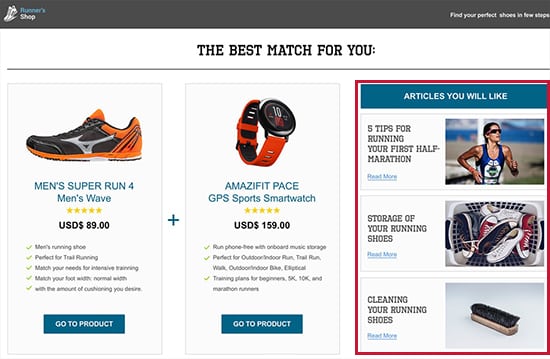
“Helping and selling are only two letters apart,” says Jay Baer
When you help people find what they need and become their trusted advisor who helps them solve problems, do something better or simply be better, you’re building long-term relationships.
The paradigm shift has to first start in your own mind. Become a helper first, then a seller. This change in attitude will turn you into a truly customer-centric business, and as we’re all aware, that’s the one quality that will make or break businesses in a digital world.



